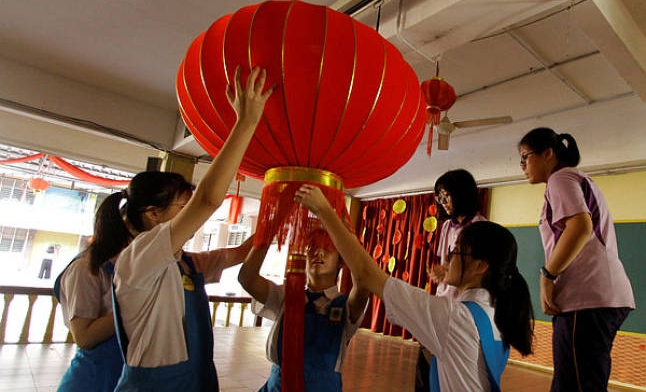
By Mariam Mokhtar
What difference does it make if a festival is religious, or cultural? In multicultural Malaysia, non-Christians celebrate Christmas with their Christian friends, and non-Muslims join their Muslim friends for Raya celebrations. We've done it for centuries.
Normal Muslims wish the Hindus 'Happy Deepavali', say 'Merry Christmas' to the Christians, and express 'Gong Xi Fa Cai' to their Chinese friends, but in Malaysia, there exists a small minority of hard-core, conservative Malays who practise the ketuanan Melayu (Malay superiority) mentality.
Why are they allowed to persist? Why can't the authorities make an example of them, and punish them severely, to prevent more inflammatory tactics? Why should the majority of the rakyat be terrorised and bullied by these bigots?
For millenia, the winter and summer solstices, agricultural events, folklores, religious beliefs, harvests and military conquests, have determined many festivals. Festivals help to bond communities, and are nation-building, because people of different social standings, faiths and cultures, are brought together. They also provide an opportunity for estranged family members and friends to meet.
If one's faith is strong, the decorations, the food one eats, the singing and the rituals we join to help celebrate our friend's festival, is not going to diminish our own religious convictions.
In the days before mass entertainment, people looked forward to festivals because these were entertaining. They had a brief respite from their busy, demanding schedules, and could interact with their neighbours.
Religious or cultural festivals also help boost the economy because of the sale of items and services which are specifically produced for the festival, and the new clothes and shoes which people buy to look good.
Last week, vice president of Parti Bumiputera Perkasa Malaysia (PUTRA) Mohd Khairul Azam Abdul Aziz threatened to report SMK Pusat Bandar Puchong 1 for bedecking the school in Chinese New Year decorations.
His actions were both stupid and intimidating. He probably wanted to create an aura of fear amongst insecure Malay parents, but at the same time, he sent a message to others that he really does not care if he causes further divisions in our already fractured society.
The school was doing its best to project an image of unity by celebrating its multicultural identity, but Mohd Khairul appears to continue to practise the indoctrination which Umno-Baru have promulgated for many decades. Why is he allowed to do this in the New Malaysia?
The lawyer said the display of CNY decorations was "unconstitutional". He needs to have another read of the Malaysian constitution to realise that he is wrong.
He also claimed that Muslim parents had complained that the decorations were an attempt to propagate a non-Islamic religion amongst the students. Really?
How many parents complained? In today's culture of fake news and fake postings on social media, how can we be assured his allegations were genuine?
It is shameful that soon after Mohd Khairul made his threats, the school took down the decorations. Bullies like Mohd Khairul should not be humoured.
Three weeks ago, Malaysians joined their Christian friends to celebrate the birth of Christ. No one made a fuss of the Christmas decorations in hotels and shopping malls. So why is Mohd Khairul being aggressive towards the Chinese?
The Hindu Ponggal festival, which occurs at the end of the winter solstice, is widely celebrated amongst the Tamil community. Traditionally, rice is boiled in a clay pot outdoors as a symbolic gesture to the gods to thank them for a successful harvest. No one is suggesting that the non-Hindus who stir the rice are wannabe Hindus. They are just joining in their friends' celebrations in a spirit of togetherness.
So, when Malaysians celebrate Gawai in Sarawak, or Kaamatan in Sabah, next June, will Mohd Khairul make a fuss, too?
It is sad that some Malays believe that the cross, the CNY decorations and stirring the Ponggal pot of rice, will induce a Muslim to change his religion. Is his faith that weak?
What are the statistics to show that hordes of Muslims have left their faith after decades of CNY, Christmas and Deepavali celebrations? Conversely, have scores of non-Muslims who are subjected to Muslim prayers before official gatherings, the azan in their neighbourhood or on radio and television, been induced to convert to Islam?
Why has the Malaysian education weakened some Malay minds? Is it the influence of religion, or of Umno-Baru indoctrination? Perhaps prime minister Dr Mahathir Mohamad, who is also the acting Minister of Education will reverse this trend of negative thinking which is prevalent amongst some Malays.
After 62 years, it is sad that the various communities are more divided than ever. The IGP and individual ministers are not strong enough to stop the rot.
But one man can. If he wants us to achieve his dream of a developed nation state, Dr Mahathir can stop the disunity by severely punishing the racial and religious extremists.
Mahathir has nothing to lose by acting decisively, but generations of Malaysian school children will suffer, if he does not end their betrayal.
Sources:
1. Malay Mail: CNY nothing to do with religion, says foreign minister after Malay party raises bogey in Puchong school decor
2. Malay Mail: Minister says Ponggal not 'religious' festival, will raise alleged MoE guideline in Cabinet meet
3. The Sun Daily: Police promise action against personnel involved in removal of CNY decorations
4. New Straits Times: Politicians hit out at Putra over CNY decorations issue
(Mariam Mokhtar is a Freelance Writer.)
ADVERTISEMENT
ADVERTISEMENT


































